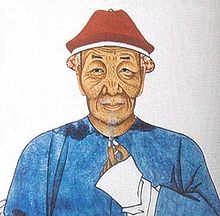Pu Songling
Pu Songling | |
|---|---|
 | |
| Born | 5 June 1640 Zibo, Shandong, Qing China |
| Died | 25 February 1715 (aged 74) |
| Occupation | Writer |
| Language | Classical Chinese |
| Nationality | Chinese |
| Period | Qing dynasty |
| Subject | Chinese literature |
| Notable works | Strange Stories from a Chinese Studio (Liaozhai zhiyi) |
| Pu Songling | |||
|---|---|---|---|
| Traditional Chinese | 蒲松齡 | ||
| Simplified Chinese | 蒲松龄 | ||
| |||
Pu Songling (Chinese: 蒲松齡, 5 June 1640 – 25 February 1715) was a Chinese writer during the Qing dynasty, best known as the author of Strange Stories from a Chinese Studio (Liaozhai zhiyi).[1]
Biography[]
Pu was born into a poor merchant family from Zichuan (淄川, in Zibo, Shandong). At the age of 18, he received the Xiucai degree in the Imperial examination; it was not until he was 71 that he was awarded the Gongsheng ("tribute student") degree for his achievement in literature rather than for passing the Imperial examinations.
He spent most of his life working as a private tutor, collecting the stories that were later published in Strange Stories from a Chinese Studio in 1740. Some critics attribute the Vernacular Chinese novel Xingshi Yinyuan Zhuan ("Marriage Destinies to Awaken the World") to him.
Translations of his work[]
- Strange Tales from Liaozhai (tr. Sidney L. Sondergard). Jain Pub Co., 2008. ISBN 978-0-89581-001-4.
- Strange Tales from a Chinese Studio (tr. John Minford). London: Penguin, 2006. 562 pages. ISBN 0-14-044740-7.
- Strange Tales from the Liaozhai Studio (Zhang Qingnian, Zhang Ciyun and Yang Yi). Beijing: People's China Publishing, 1997. ISBN 7-80065-599-7.
- Strange Tales from Make-do Studio (Denis C. & Victor H. Mair). Beijing: Foreign Languages Press, 1989.
- Strange Tales of Liaozhai (Lu Yunzhong, Chen Tifang, Yang Liyi, and Yang Zhihong). Hong Kong: Commercial Press, 1982.
- Strange Stories from the Lodge of Leisures (George Soulié). London: Constable, 1913.
- Strange Stories from a Chinese Studio (tr. Herbert A. Giles). London: T. De La Rue, 1880.[2] ISBN 1-4212-4855-7.
Movies[]
- The Knight of Shadows: Between Yin and Yang 2019, Jackie Chan as Pu Songling
References[]
- Encyclopædia Britannica 2005 Ultimate Reference Suite DVD, – P'u Sung-ling
Further reading[]
- Chun-shu, Chang, and Shelley Hsueh-lun Chang (1998) Redefining History: Ghosts, Spirits, and Human Society in P'u Sung-ling's World, 1640–1715. Ann Arbor: University of Michigan Press. ISBN 0-472-10822-0
- Judith T. Zeitlin (1993). Historian of the Strange : Pu Songling and the Chinese Classical Tale. Stanford, Calif.: Stanford University Press, xii, 332p. ISBN 0-8047-2085-1.
- Owen, Stephen, "Pu Song-ling (1640–1715), Liao-zhai's Record of Wonders," in Stephen Owen, ed. An Anthology of Chinese Literature: Beginnings to 1911. New York: W. W. Norton, 1997. p. 1103-1126 (Archive).
- Hummel, Arthur W. Sr., ed. (1943). . Eminent Chinese of the Ch'ing Period. United States Government Printing Office.
Notes[]
- ^ Judith T. Zeitlin, Historian of the strange: Pu Songling and the Chinese classical tale (Stanford University Press, 1993).
- ^ Bleiler, Everett (1948). The Checklist of Fantastic Literature. Chicago: Shasta Publishers. pp. 126.
External links[]
| Wikisource has original works written by or about: Pu Songling |
| Wikiquote has quotations related to: Pu Songling |
- Works by Pu Songling at LibriVox (public domain audiobooks)

- 1640 births
- 1715 deaths
- 17th-century Chinese novelists
- 18th-century Chinese novelists
- Chinese male short story writers
- Collectors of fairy tales
- Qing dynasty short story writers
- Short story writers from Shandong
- Strange Stories from a Chinese Studio
- Writers from Zibo